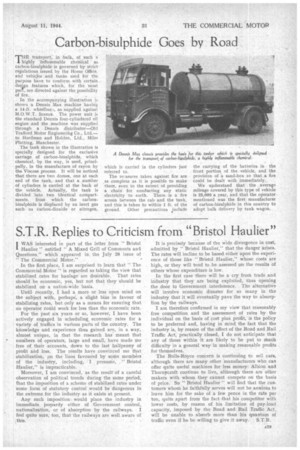S.T.R. Replies to Criticism from "Bristol Haulier"
Page 31

If you've noticed an error in this article please click here to report it so we can fix it.
IWAS interested in part of the letter from " Bristol Haulier" entitled " A Mixed Grill of Comments and Questions." which appeared in the July 28 issue of "The Commercial Motor."
In the first place, I am surprised to learn that " The Commercial Motor •' is regarded as taking the vie* that stabilized rates for haulage are desirable. That rates should be economic, yes, but not that they should be stabilized on a nation-wide basis.
Until recently, I had a more or less open mind on the subject with, perhaps', a slight bias in favour of stabilizing rates, but only as a means for ensuring that no operator could work for less than the economic rate.
For the past six years or so, however, I have been actively engaged in scheduling, economic rates for a variety of traffics in various parts of the country. The knowledge and experience thus gained are, in a way, almost unique, in that the research has meant that numbers of operators, large and small, have made me free of their accounts, down to the last halfpenny of profit and loss. The results have convinced me that stabilizatfon, pu the lines favoured by some members of the industry, including, I presume, . " Bristol Haulier," is impracticable.
Moreover, I am convinced, as the result of a careful observation of political trends during the same period, that the imposition of a scheme Of stabilized rates under some form of statutory control would be dangerous in the extreme for the industry as it exists at present.
Any such imposition would place the industry in immediate, jeopardy either of Government control, nationalization, or of absorption by the railways. I feel quite sure, too, that the railways are well aware of ,this. It is precisely because of the wide divergence in cost, admitted by " Bristol Haulier," that the danger arises. The rates will incline to be based either upon the experience of those like "Bristol Haulier," whose costs are high, or they will tend to be assessed on the results of others whose expenditure is low.
In the first case there will be a cry from trade and industry that they are being exploited, thus opening the door to Government interference. . The alternative will involve economic disaster for so many in the industry that it will eventually pave the way to absorption by the railways.
I am therefore confirmed in my view that reasonably free competition and the assessment of rates by the individual on the basis of cost plus profit, is the policy to be preferred and, having in mind the fact that the industry is, by reason of the effect of the Road and Rail Traffic Act, practically 'closed, I do not anticipate that any of those within it are likely to be put to much difficulty in a general way in making reasonable profits for themselves.
The Rolls-Royce concern is continuing to sell cars, although there are many other Manufacturers who can offer quite useful machines for less money: Albion and Thornycroft continue to live, although there are other makers with whom they cannot compete on the basis of price. So " Bristol Haulier" will find that the customers whom he faithfully serves will not be anxious to leave him for the sake of a few pence in the rate per ton, quite apart from the fact-that his competitor with lower costs, by reason of his limitation of pay-load capacity, imposed by the Road and Rail Traffic Act, will be unable to absorb more than his quantum of traffic even if he be willing to give it away. S.T.R.




















































